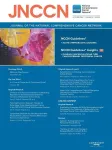(Press-News.org) PLYMOUTH MEETING, PA [October 24, 2024] — New research published online-ahead-of-print in JNCCN—Journal of the National Comprehensive Cancer Network found that people with newly-diagnosed hormone receptor (HR)-negative, human epidermal growth factor receptor 2 (HER2)-positive breast cancer were more likely to receive timely, guideline-concordant treatment and have longer survival in states that participate in Medicaid expansion under the Affordable Care Act (ACA).
A team of researchers—led by the American Cancer Society (ACS), and including Kathryn J. Ruddy, MD, MPH, of the Mayo Clinic Comprehensive Cancer Center, a former NCCN Foundation® Young Investigator Award recipient—used data from the National Cancer Database (NCDB) to review results for women across the United States, age 18-62, who were diagnosed with this type of breast cancer between 2010 and 2018. 19,248 of the patients lived in Medicaid expansion states, while 12,153 resided in non-expansion locations. In the expansion states, the 2-year survival rate increased from the 2010 baseline rate of 93.9% to 95.0% across the study period. However, in the non-expansion states, 2-year survival declined slightly from 94.0% to 93.9%. The biggest difference was seen in patients with Stage III disease.
“Expanding Medicaid to the 10 states that have yet to do so can help ensure that more patients with cancer benefit from life-saving treatments,” said lead researcher Kewei Sylvia Shi, MPH, Surveillance and Health Equity Science, American Cancer Society. “It’s crucial to increase access to oncology services, expand insurance coverage, and streamline diagnostic and referral processes. Stage III cancer represents a critical point in disease presentation and can further progress and become incurable if undertreated. Having health insurance coverage will make it more likely for these patients to receive timely and comprehensive access to life-saving therapies, have better medication adherence, and complete treatment, which leads to better survival outcomes.”
HR-negative, HER2-positive breast cancer is an aggressive subtype that accounts for approximately 5% of all breast cancer diagnoses.1 This is the first study to focus on the impact of Medicaid expansion on that specific population.
The study found that treatment according to recommendations from evidence-based, expert consensus driven clinical practice guidelines—such as the National Comprehensive Cancer Network® (NCCN®) Clinical Practice Guidelines in Oncology (NCCN Guidelines®)— was more likely to begin within 90 days from diagnosis in the expansion states.
“This study reinforces the important role Medicaid expansion plays in ensuring that women newly diagnosed with HR-negative, HER2-positive breast cancer have equitable access to the healthcare services they need—especially when prognosis depends on access to treatment,” said Millicent Gorham, CEO of the Alliance for Women’s Health and Prevention, who was not involved in this research. “Breast cancer is far too common, and rates are increasing among younger women, making it critical that policymakers also prioritize women’s access to preventive health screenings and appropriate treatments.”
To read the entire study, visit JNCCN.org. Complimentary access to “Association of Medicaid Expansion With Timely Receipt of Treatment and Survival Among Patients With HR-Negative, HER2-Positive Breast Cancer” is now available online. The article will also be featured in the November 2024 print edition of the journal.
# # #
About JNCCN—Journal of the National Comprehensive Cancer Network
More than 25,000 oncologists and other cancer care professionals across the United States read JNCCN—Journal of the National Comprehensive Cancer Network. This peer-reviewed, indexed medical journal provides the latest information about innovation in translational medicine, and scientific studies related to oncology health services research, including quality care and value, bioethics, comparative and cost effectiveness, public policy, and interventional research on supportive care and survivorship. JNCCN features updates on the NCCN Clinical Practice Guidelines in Oncology (NCCN Guidelines®), review articles elaborating on guidelines recommendations, health services research, and case reports highlighting molecular insights in patient care. JNCCN is published by Harborside/BroadcastMed. Visit JNCCN.org. To inquire if you are eligible for a FREE subscription to JNCCN, visit NCCN.org/jnccn/subscribe. Follow JNCCN at x.com/JNCCN.
About the National Comprehensive Cancer Network
The National Comprehensive Cancer Network® (NCCN®) is a not-for-profit alliance of leading cancer centers devoted to patient care, research, and education. NCCN is dedicated to improving and facilitating quality, effective, equitable, and accessible cancer care so all patients can live better lives. The NCCN Clinical Practice Guidelines in Oncology (NCCN Guidelines®) provide transparent, evidence-based, expert consensus recommendations for cancer treatment, prevention, and supportive services; they are the recognized standard for clinical direction and policy in cancer management and the most thorough and frequently-updated clinical practice guidelines available in any area of medicine. The NCCN Guidelines for Patients® provide expert cancer treatment information to inform and empower patients and caregivers, through support from the NCCN Foundation®. NCCN also advances continuing education, global initiatives, policy, and research collaboration and publication in oncology. Visit NCCN.org for more information.
[1] National Cancer Institute. Cancer stat facts: female breast cancer subtypes. Available at: https://seer.cancer.gov/statfacts/html/breast-subtypes.html
END
Decades after it was first found in Japan, a species of crustacean with unique black-and-white coloring that resembles a panda has been confirmed to be new to science. Melitid amphipods are shrimp-like crustaceans found worldwide. The newly classified Melita panda — named after the charismatic mammal — was first found in the 1990s. Details of the discovery and morphological analysis were published in a ZooKeys article on 21 September.
The discovery of the Melita panda highlights the importance of studying species taxonomy, which is the naming and classification of organisms, for conservation efforts. It is impossible to know if a species is in ...
BOSTON (Oct. 24, 2024) – With the rise in incidence of food allergies in children in the past decade, there has been a corresponding increase in the need for professional psychology services due to increased anxiety. A new study being presented at this year’s American College of Allergy, Asthma and Immunology (ACAAI) Annual Scientific Meeting in Boston showed a more than 50% increase in psychology referrals at one center in 2023 compared to yearly referrals from 2018-2022.
“Our center has devoted significant resources to address the psychosocial support needed by many families who have children with food allergies,” ...
BOSTON (Oct. 24, 2024) – Anaphylaxis can come on suddenly and without warning, and because its symptoms can be fatal, it is scary for those who encounter it. Two new studies being presented at this year’s American College of Allergy, Asthma and Immunology (ACAAI) Annual Scientific Meeting in Boston show it is not only patients and caregivers who misunderstand how best to treat anaphylaxis: emergency medical professionals often follow incorrect protocols for treating severe allergic reactions.
“We know early recognition of anaphylaxis and treatment with epinephrine improves outcomes,” says Sasha Alvarado, DO, Co-Director of Quality ...
BOSTON (Oct. 24, 2024) – About 10% of Americans believe they are allergic to penicillin, and approximately 90% of those patients are not actually allergic. As a result, those with the penicillin allergy label are often prescribed more toxic, dangerous and expensive antibiotics that might not be necessary or effective. A new study being presented at this year’s American College of Allergy, Asthma and Immunology (ACAAI) Annual Scientific Meeting in Boston showed that syphilis patients labeled as penicillin allergic who are low risk should be delabeled to avoid treatment failure and other negative ...
BOSTON (Oct. 24, 2024) – In many cultures, it is common to burn incense for religious and cultural practices, including meditations, celebrations and spiritual and ancestral worship. A new medically challenging case being presented at this year’s American College of Allergy, Asthma and Immunology (ACAAI) Annual Scientific Meeting in Boston warns that, for those with allergies and asthma, health problems from burning incense can be a significant risk to adults and children.
“Our patient was an 87-year-old woman with history of asthma and COPD, ...
BOSTON (Oct. 24, 2024) – Parents of children with atopic dermatitis (AD, also called eczema) know that the allergic condition can mean a heightened risk of developing food allergies. The desire to prevent food allergies causes some parents to consider elimination diets, cutting out certain foods from their child’s diet. A new study being presented at this year’s American College of Allergy, Asthma and Immunology (ACAAI) Annual Scientific Meeting in Boston showed that elimination diets in the case ...
BOSTON (Oct. 24, 2024) – Throughout the Covid pandemic, media widely reported that Black patients were more likely than White patients to refuse vaccines, including the influenza and Covid vaccines. A new study being presented at this year’s American College of Allergy, Asthma and Immunology (ACAAI) Annual Scientific Meeting in Boston showed that self-identified non-White patients were less likely to demonstrate vaccine-hesitancy than the self-identified White patient group.
“We found ...
BOSTON (Oct. 24, 2024) – Eosinophilic Esophagitis (EoE), a disorder of the esophagus, is increasingly recognized as a major cause of swallowing difficulties in children and adults. It affects about one in 2,000 people and is part of a spectrum of allergic conditions. A new study being presented at this year’s American College of Allergy, Asthma and Immunology (ACAAI) Annual Scientific Meeting in Boston investigated the probability of patients with certain atopic (allergic) conditions developing EoE.
“We did a separate analysis of four common allergic conditions – asthma, allergic rhinitis, atopic dermatitis and food allergy – to determine ...
BOSTON (Oct. 24, 2024) – People have heard for years that climate change is having a significant impact on plant vegetation patterns and influencing how pollen and mold produce. A new study being presented at this year’s American College of Allergy, Asthma and Immunology (ACAAI) Annual Scientific Meeting in Boston showed that, in Chicago, there has been a significant increase in sensitization to pollens and molds in patients with nasal allergies.
“Our goal was to analyze changes in pollen sensitization patterns ...
A single treatment with, a CRISPR-Cas9 based gene editing therapy, is enough to replace the daily medication of patients with hereditary angioedema (HAE), a condition characterized by severe, painful and sudden onset of swelling, sometimes resulting in death. Confirming the findings published earlier this year from researchers from Amsterdam UMC, the University of Auckland and Cambridge University Hospitals NHS Foundation Trust. This phase two study is published today in the New England Journal of Medicine and presented at American College of Allergy, Asthma & Immunology's annual congress on the ...


